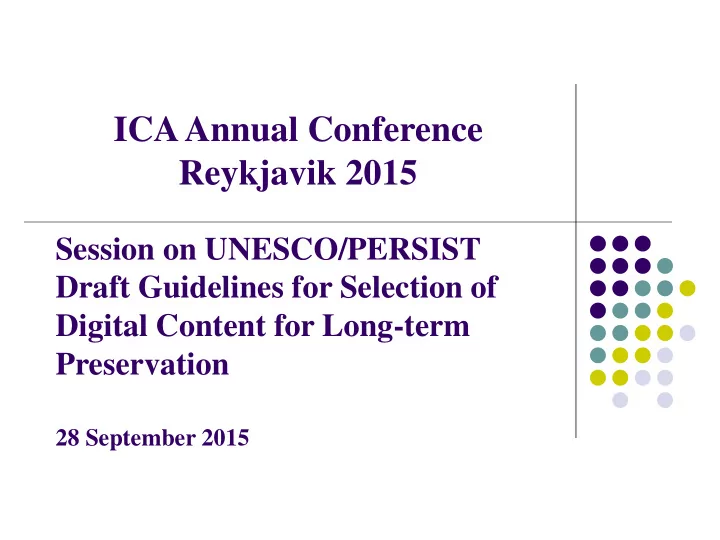

ICA Annual Conference Reykjavik 2015 Session on UNESCO/PERSIST Draft Guidelines for Selection of Digital Content for Long-term Preservation 28 September 2015
The UNESCO/PERSIST Project
The PERSIST Project PERSIST stands for Platform to Enhance the Sustainability of the Information Society Trans-globally. Arose out of the UNESCO Memory of the World (MOW) in the Digital Age conference in Vancouver in 2012, and the adoption of the Vancouver Declaration on the preservation of digital heritage . .
Background PERSIST : a collaborative project of UNESCO, IFLA, ICA and other partners to address globally the pressing questions about preserving digital heritage in terms of policy and strategies, technical issues, selection criteria, responsibility and division of labour. Premise: UNESCO’s MOW Program is ideally positioned to lead a high- level global policy discussion among heritage institutions, industry and government .
The PERSIST Task Forces PERSIST : led by a steering committee with representatives from UNESCO, ICA, and IFLA, and has three task forces: Policy Technology Content selection
The PERSIST Task Forces The Policy Task Force (Chair UNESCO) is enabling a high-level policy debate among IT leaders, heritage institutions, and governments, and promoting global awareness The Technology Task Force (Chair David Fricker, President ICA) is developing a repository for legacy software The Content Task Force (Chair Ingrid Parent, IFLA) is developing Guidelines for the selection of digital content for long-term preservation
The Content Task Force A comprehensive world-wide survey on existing digital selection policy was conducted in early 2015 by Wilbert Helmus The Content Task Force was created to prepare draft Guidelines for the selection of digital content for long-term preservation after its first meeting in April 2015
Members of Content Task Force Eight members in the Content Tasks Force: Ingrid Parent : Chair (IFLA) Julia Brungs : Secretary (IFLA) Ngian Lek Choh (National Library Board of Singapore – IFLA GB, Singapore) Clement Oury (ISSN, France) Katarzyna Ślaska (National Library of Poland, Poland) Sarah Choy (Legislative Council Archives, Hong Kong) Rob Fisher (Library and Archives Canada) Nicholas Crofts (International Council of Museums (ICOM) International Committee for Documentation (CIDOC), Switzerland)
Content Selection Guidelines UNESCO : a range of standard-setting instruments, e.g. Conventions, recommendations, declarations and charters. Guidelines are not legally binding. Member states are invited to apply them as the baseline or best practices. The Content Selection Guidelines are designed primarily for libraries, archives and museums. Audience: aim at a diverse audience including professionals and administrators who deal with digital materials and plan to prepare a policy on selection of digital materials for long-term preservation. A Generic Framework: for general application (with advice on specific application).
Content Selection Guidelines The Content Task Force had its first meeting in April 2015 and a virtual conference in June, The first draft of the Guidelines was drawn up in August. The first draft was presented to members of IFLA in its International Congress in Cape Town in late August 2015. A revised draft was prepared based on input from the FILA meeting and is now presented in ICA at Reykjavik in September 2015. Evolving – a work in progress. Comments and suggestions are urgently needed from the archives and museum community.
Challenges and Concerns Different terminology used by librarians, archivists and curators Diversity of the heritage community - Guidelines to be applied by libraries, archives, and museums of all shapes and sizes. Different professional focuses and priorities: Libraries – issues relating to legal deposit, e-publications, harvesting websites and social media sites, and short-term vs. long-term use Museums – digital heritage is primarily information about physical holdings; metadata, research information, digital surrogates, administrative records; also born-digital art, etc. Archives – authenticity of records, early selection and transfer, reappraisal, costs, regulatory restrictions on access and use
Focus of the Guidelines Understanding the problem: proliferation of digital information and preservation costs of ever-changing digital formats and carriers makes selection essential Selection based on mandate, significance, capacity, resources and sustainability Overarching principles on how to assess value of digital materials, how to prioritize and what to select for long-term preservation, access and use.
Focus of the Guidelines Selection should be legally compliant, cost-effective and technically feasible. Collection strategies to meet different needs; adapting existing appraisal policies to digital environment The role of national institutions and shared responsibilities among institutions, non profit and private sector organizations. Importance of metadata Legal implications requiring international and national legislative measures to overcome restrictions and provide for clear roles and responsibilities
Directions and Way Forward Should the Guidelines be on principles and/or practices? Should be Guidelines be more general or specific? Are the Guidelines relevant and useful for the wide range of heritage institutions and others? Importance of stakeholders’ feedback What do you think should be in the Guidelines? What is important from an archival perspective? The second draft is on the IFLA website http://www.ifla.org/files/assets/hq/temporary/persistcontentgui delinesdraftdraft2september2015.pdf Guidelines will be revised for presentation to UNESCO around November 2015.
Welcome Comments and Suggestions Please send your views by 15 October 2015 to: sarahccchoy@gmail.com or robert.fisher@canada.ca Reviewers are welcome, please contact us! Thank you!
Recommend
More recommend